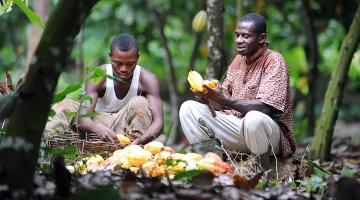The subject of cocoa prices and the income of Ghanaian smallholder cocoa farmers is a complex one, influenced by various factors within the cocoa supply chain.
While cocoa prices may have seen record hikes in recent times, it does not always directly translate to an immediate increment in the farmgate price for cocoa farmers, particularly in Ghana.
For example, on Wednesday, June 28 this year, cocoa prices on the London futures market surged to 2,590 pounds per metric ton, the highest since 1977.
A forecasted global supply deficit on the back of bad weather in West Africa is said to have occasioned this 46-year high in the ICE benchmark price.
With the headlines awash with the trending news of the historic cocoa price increases on the international market, it is only natural that some cocoa farmers, particularly those in Ghana, started asking questions.
Here are some reasons the sweet development on the futures markets may not have trickled down yet into the pockets of Ghana’s cocoa farmers.
1. Global Market Dynamics: Cocoa prices are primarily determined by global supply and demand dynamics, which are influenced by factors such as weather conditions, global cocoa production volumes, economic conditions in importing and consuming countries, and fluctuations in currency exchange rates.
These factors can lead to price volatility in the global cocoa market, and it takes time for price changes to be reflected at the farmgate level, if at all, as Ghanaian cocoa farmers are experiencing now.
2. Country Marketing System: Ghana markets its annual cocoa crop by forward sales contracts as against spot marketing.
Forward sales refers to agreements made between cocoa producers or exporters and buyers to sell cocoa beans at a future date, typically at a predetermined price.
This allows the parties to secure future cocoa supplies or sales, mitigate price risks, and provide stability in the cocoa market.
That said, the daily price changes announced in the news will neither apply to Ghana’s export price nor the farmgate price.
3. Producer Price Board: Flowing from its marketing system, Ghana has a unique farmgate price determination set-up implemented by a government inter-agency board known as the Producer Price Review Committee (PPRC) chaired by the Minister of Agriculture.
PPRC reviews the farmgate or cocoa producer price, and announces same once every year at the commencement of the cocoa year, in October.
Considerations for arriving at the season’s producer price include the international market price, internal marketing costs, logistics rates, currency exchange rates as well as allocation to a price stabilisation fund, which kicks in to cushion farmers from adverse market conditions.
For instance, during the 2021 price collapse on the international market due to oversupply, Ghanaian cocoa farmers were insulated from cuts to farmgate prices, unlike their colleagues in other producer nations in the region.
4. Lack of Direct Market Access: Cocoa farmers in Ghana do not have direct access to the global cocoa market to sell their produce.
Instead, they are enjoined by the Ghana Cocoa Board (Cocobod) law to sell their cocoa beans solely to licensed buying companies (LBCs).
The LBCs are intermediaries who undertake cocoa purchasing on behalf of the state-owned exporter, Cocoa Marketing Company (CMC).
They play a significant role in purchasing, grading, warehousing and transportation of cocoa beans from the community and district levels.
The contributions of these intermediaries are rewarded with margins by the PPRC in the determination of the producer price.
In light of this market access architecture, Ghana’s cocoa farmers will be unable to cash in on the prevailing price surge on the international market.
5. Mere Price Takers: Ghana, the world’s second-largest cocoa producer country, like many others is a price taker.
They have limited bargaining power in an international market architecture where buyers, not producers, determine the price for the cocoa commodity.
This structure is mirrored in-country whereby cocoa farmers often have no democratic voice or no bargaining power due to weak governance and organisation.
This makes it challenging for them to negotiate higher prices or demand fair compensation for their produce.
Collective action through cooperative societies or independent farmer organisations can help farmers strengthen their bargaining power and advocate for better prices.
This may apply to producer nations, as Cote d’Ivoire and Ghana have shown the way through their bilateral cooperation on cocoa – Cote d’Ivoire-Ghana Cocoa Initiative (CIGCI).
It is now clear some of the reasons cocoa farmers in Ghana may not immediately benefit from the gains of a price surge on the international market as per the country’s internal cocoa sector policies.
To sum it up, it is important to note that the Ghanaian system offers some perks to cocoa farmers that may make them the envy of farmers elsewhere.
Inherent in its producer compensation policies, the government of Ghana through Cocobod undertakes key interventions to support cocoa production activities in the country.
Aside from the farmgate price, Ghana’s cocoa farmers benefit from agro-input subsidies, free farm extension services, special productivity enhancement programmes, quality control support and the recently introduced cocoa farmers’ pension scheme.
- Illegal Mining Threatening Ghana’s $230M Cocoa Rehabilitation - April 10, 2024
- Ghana Raises Cocoa Farmgate Price by 58.26% to GHC2,070 per bag - April 5, 2024
- New Standard for Measuring Cocoa Household Income Launched - April 5, 2024
